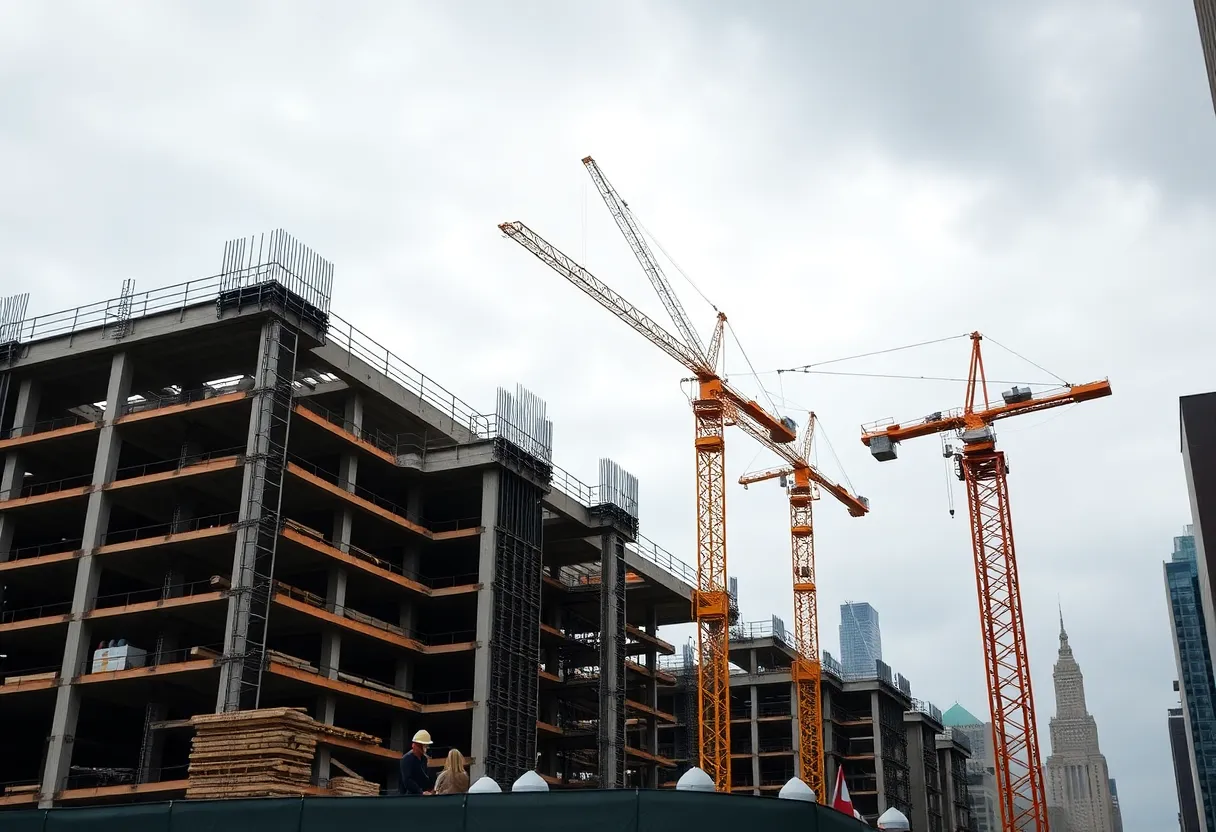News Summary
The construction industry in Chicago is experiencing a significant crisis due to rising tariffs and material costs, reshaping the environment for developers and contractors. With increased costs threatening housing affordability, many builders are scaling back projects. Tariffs on essential materials like steel and aluminum are driving up construction expenses, leading to reduced housing availability, particularly for low-income families. Experts warn that without intervention, the construction landscape may continue to worsen, affecting the accessibility of new homes for potential buyers across the nation.
Chicago Construction Industry Faces Challenges Amid Rising Costs
The construction industry in Chicago is entering a crisis phase as rising tariffs and increasing material costs add pressure to an already strained market. Industry experts are warning that these financial burdens will not only affect builders but also potentially increase housing prices for consumers. As tariffs continue to escalate, the cost of building new homes across the region is poised to rise sharply.
Impact of Tariffs on Building Costs
The tariffs imposed by the federal government have created waves of uncertainty in construction costs. With approximately one-third of U.S. lumber sourced from abroad, and around 70% coming specifically from Canada, any increase in tariffs leads to significant consequences. Current projections suggest that new home framing costs could see an increase of $10,000 to $15,000 due to the strain caused by these tariffs.
In Southern California, lumber suppliers have already noted a reduction in demand for new homes, attributed to inflation and rising interest rates. These economic conditions are causing hesitancy among contractors, making it harder for them to secure financing for new projects. The situation is exacerbated by the overall increase in construction costs, which impacts both residential and commercial developments. Consequently, this could lead to higher rent costs in the long term.
Developers Adjust Plans Amid Economic Uncertainty
Developers in the Chicago area are responding to the challenging economic climate by reassessing their investment strategies. For instance, one developer has revised their original proposal from a 210-unit mixed-use project down to just 46 units. Such drastic adjustments reveal the pervasive sense of uncertainty about the future of home construction and the ongoing trade issues.
While some domestic jobs in sectors like sand and cement may be preserved, the broader outlook indicates that overall construction costs will continue to rise. The escalation of material prices plays a central role in these challenges, which diminishes the viability of many development projects. Tariffs are effectively acting as a tax on builders and consumers, complicating the path to affordable housing, particularly for low-income communities.
The Broader Economic Impact
The repercussions of rising material costs are not confined to the construction sector alone; they extend into the realm of mortgage affordability. High-interest rates coupled with increased prices are placing additional burdens on potential homebuyers. Experts note that these conditions further entrench existing barriers to homeownership, particularly for those in the low-income bracket.
There is a growing concern that these economic conditions will lead to a significant shortfall in housing comparability across the nation, which will only worsen the affordability crisis that many communities are currently experiencing. As developers weigh the risks against potential returns, many are grappling with the unpredictability caused by ongoing tariff debates and fluctuating costs. This sense of instability hinders long-term planning and reduces overall confidence in the market.
Maintaining Financial Health Amid Challenges
Despite these hurdles, there remains a beacon of hope for middle-market contractors. It has been noted that capital is still accessible for those who work closely with informed lenders. For contractors who can adapt and navigate these tumultuous economic waters, there may still be opportunities to secure funding and successfully complete projects.
In conclusion, the construction industry in Chicago is facing a multifaceted crisis as tariffs and soaring costs impact the landscape for builders and consumers alike. Developers are reevaluating their plans in response to economic uncertainties, while potential homebuyers are confronted with rising prices and higher interest rates. As these trends continue to unfold, the industry will need to adapt swiftly to maintain a foothold in an increasingly challenging environment.
Deeper Dive: News & Info About This Topic
Additional Resources
- Crain’s Chicago Business: Contractors Can Stay Resilient Amid Tariffs and Rising Costs
- ABC7 Chicago: Experts Say Tariffs Expected To Have Big Impact on Cost of New Home Construction
- Newsweek: Chicago Development Shrinks Under Trump Tariffs
- Chicago Agent Magazine: What Tariffs Mean for Homebuilding Economy
- Google Search: Impact of Tariffs on Housing Market
Author: Construction CA News
The CALIFORNIA STAFF WRITER represents the experienced team at constructioncanews.com, your go-to source for actionable local news and information in California and beyond. Specializing in "news you can use," we cover essential topics like product reviews for personal and business needs, local business directories, politics, real estate trends, neighborhood insights, and state news affecting the area—with deep expertise drawn from years of dedicated reporting and strong community input, including local press releases and business updates. We deliver top reporting on high-value events such as the Rose Parade, Coachella, Comic-Con, and the California State Fair. Our coverage extends to key organizations like the California Building Industry Association and Associated General Contractors of California, plus leading businesses in technology and entertainment that power the local economy such as Apple and Alphabet. As part of the broader network, including constructionnynews.com, constructiontxnews.com, and constructionflnews.com, we provide comprehensive, credible insights into the dynamic landscape across multiple states.


